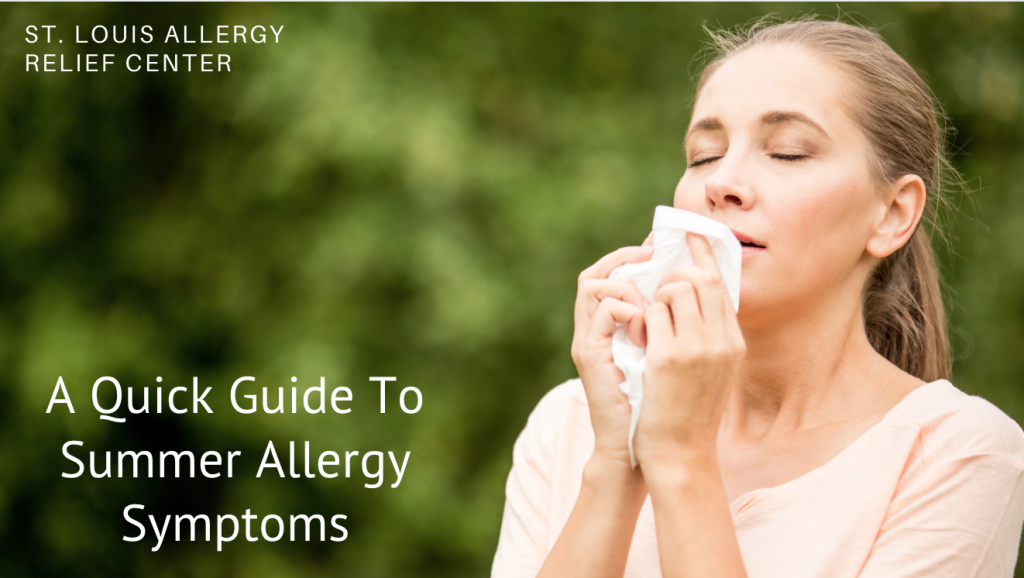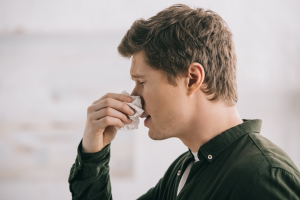A Quick Guide To Summer Allergy Symptoms

Seasonal allergies can make even the most mundane tasks challenging. And these allergies are not restricted to the springtime since summer is also notorious for causing many allergic reactions. Pollen is abundant during the summer months because the plants which produce allergens will change in accordance with the weather, as opposed to dying off after the rainy season. Other catalysts for allergies during the hottest time of the year include mold, dust mites, stinging insects, and smog. Understanding allergy symptoms and their causes are crucial for treatment, so below are the most common problems that these irritants produce.
7 Common Summer Allergy Symptoms You Need To Know About
1. Sneezing & Congestion
Inhaling pollen causes you to sneeze when you have allergies because your immune system recognizes the foreign bodies as threats. Sneezing is the body’s way of eliminating allergens, which is why you typically sneeze after inhaling dust, pollen, and other irritants. You may also experience nasal congestion because your body releases histamines to combat the “threats” (allergens), which causes the blood vessels in your nose to dilate.
2. Runny Nose
Occasionally, everyone experiences a runny nose, with harsh weather conditions being a consistent culprit. However, during the summertime, congestion is attributed to mild irritants (e.g., pollen and spores) or the common cold. For runny noses that don’t clear up within two weeks, treat them as summer-related allergic reactions.

3. Enlarged Adenoids
The adenoids are glands that sit above the roof of your mouth, just behind the nose. Although they shrink by adulthood, nasal allergies will cause the lymph tissue to swell, which results in a constant exhausted expression. The telltale signs of enlarged adenoids include snoring, mouth breathing, chronic congestion, frequent ear infections, and swollen neck glands.
4. Itchy, Puffy, & Watery Eyes
Released histamines can cause your eyes to water and become puffy because of increased inflammation. They may also feel itchy and become even more puffy and red if you rub them. Eye reactions can additionally stem from eczema and asthma, in addition to seasonal allergies.

5. Coughing
Also known as hay fever, seasonal allergies can make you cough. Common allergy-related cough triggers include ragweed, tree, and grass pollen, as well as fungal spores. Coughs follow postnasal drip symptoms where pollen irritates nose lining, resulting in mucus that drips down your throat. Hay fever coughs usually worsen at night because mucus cannot drain as efficiently.
6. Itchy Sinuses
Histamine-related inflammation and mucus often irritate the sinuses or facial cavities that filter and humidify the air you breathe. If the sinuses cannot drain swiftly because of inflammation and irritation, hay fever can result in sinus infections that include congestion, facial pain, and near-continual mucus drainage.
7. Dark Circles Under the Eyes
Inflammation from seasonal allergies occurs when the tissue in the nasal cavities swells and forces blood to pool just beneath the eyes. The result is the development of dark circles directly below your eyelids. Also called allergic shiners, these circles don’t warrant any serious concern, but are accompanied by symptoms that demand relief, like coughing, sneezing, and itchy, watery eyes.
When it comes to seasonal allergies that are ruining your summer, head to St. Louis Allergy Relief Center. Offering a holistic approach to immunity issues, this center provides residents throughout Chesterfield, MO, and the surrounding areas with natural allergy relief assistance. Their National Board Certified practitioners help patients achieve lasting relief from the worst of their symptoms. To learn more about how they combat seasonal allergies, visit our website at www.stlouisallergyrelief.com or call (314) 384-9304 to schedule your appointment. Get additional hay fever information on Facebook.